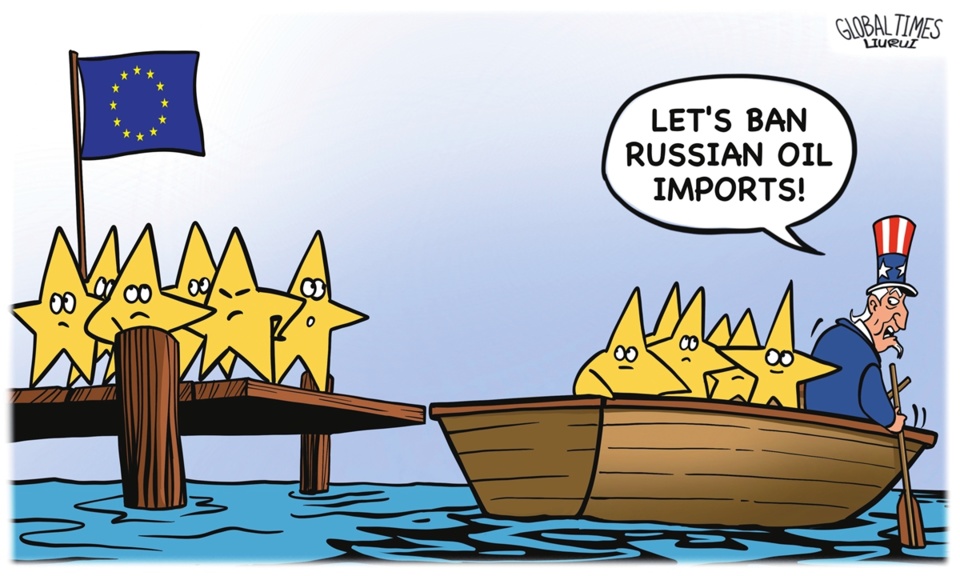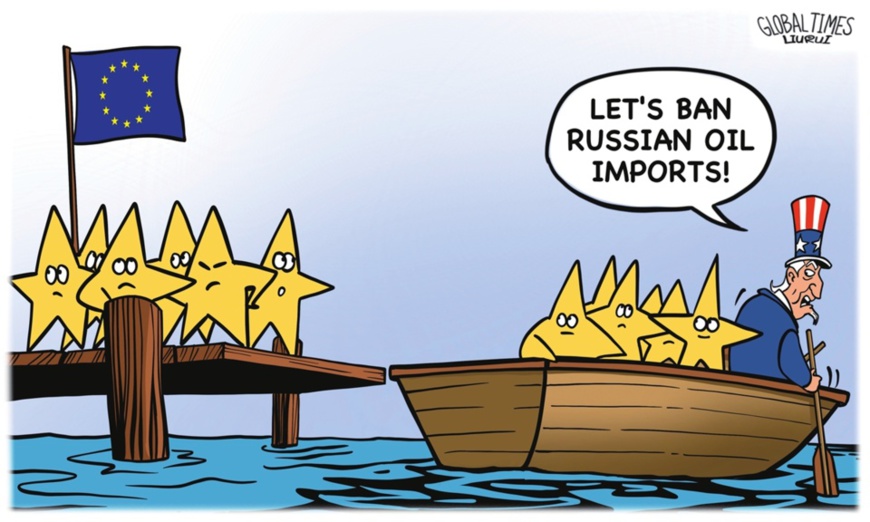By Cui Hongjian, director of the Department for European Studies, China Institute of International Studies
The Ukraine crisis has caught the attention of the entire world, making people wonder whether Europe can regain security and peace.
Historically, Europe has considerably contemplated the issue of peace and made active practice in this respect.
For instance, German philosopher Immanuel Kant published the famous essay Perpetual Peace: A Philosophical Sketch in 1795, putting forward the idea of achieving perpetual peace for humankind in practical and reasonable manner.
Even during the Cold War, European countries were able to progress in building a common security architecture through dialogues and negotiations, and created and wrote the important principle of “indivisible security” into Helsinki Final Act, Charter of Paris for A New Europe and other agreements.
However, the “Helsinki Spirit” never really put down roots in the European continent. The outbreak of the Russia-Ukraine conflict has thrown the continent into warfare once again, which proves that the existing security architecture in Europe is seriously flawed.
Although a bipolar system was long gone before the outbreak of Russia-Ukraine conflict, the “post-Cold War order” governing Europe’s security was never rid of the residual effects of the Cold War. Antagonistic contradiction was not removed and the Cold War mentality still prevailed.
The U.S., the self-proclaimed winner in the Cold War that takes Russia as the loser, has roped in European countries to conduct political discrimination and economic “reform” against Russia and squeeze the latter’s security space.
Theoretically, Europe’s security is governed by the “Helsinki Spirit” advocated by the Organization for Security and Co-operation in Europe (OSCE), but what in practice holds a dominant position is the North Atlantic Treaty Organization (NATO), which beats the drum for a security concept full of exclusiveness and confrontation.
NATO has been building up its strength by recruiting new members and expanding under its “new mission”, during which the military alliance and Russia have accumulated escalating conflicts of interest and gradually lost mutual trust. This has made Europe’s security situation seriously imbalanced.
When the Ukraine crisis was emerging and escalating, the U.S. refused to assume its responsibility to carry out direct and equal dialogues with Russia on Europe’s security issue, though there was huge room to solve the problem with diplomatic means.
Instead, the White House directed the NATO to show military deterrence, which squeezed the space for European countries to conduct diplomatic mediation. This led to an illusion that the U.S. and NATO could “provide protection” for Ukraine, and eventually prompted the outbreak of the Russia-Ukraine conflict.
The long-lasting peace in the region needs to be supported by a balanced security architecture, must be maintained by effective mutual trust measures, and requires employing all necessary means to ensure sustainable development.
The security concerns of all relevant parties should be respected, and differences in the size, strength and systems of countries should not become a dividing line separating them from each other.
Arduous journey as it may be to regain security and peace in Europe, countries in the region must take the unshirkable responsibility to build a long-term regional security architecture, as war-induced fear, refugee crisis, economic recession and poverty are even more unbearable.
To restore security and peace in Europe, the European Union needs to give full play to its role as the most important political and economic organization in the region, uniting all forces in the region and even the international community that advocate peace talks and taking all possible measures that help enhance mutual trust rather than heightening hostility to promote Russia and Ukraine to conduct dialogues and negotiations for a ceasefire as early as possible.
Europe has experienced alternate years of war and peace and should be well aware of the truth that “long-lasting peace can only be achieved by transforming enemies to friends.”
The fact is that European countries and Russia have been and will always be neighbors. Therefore, European countries should handle major issues such as expanding sanctions against Russia and increasing military aid to Ukraine in a rational and prudent manner, conduct equal and candid dialogues with Russia on the establishment of a regional security architecture, and seek to reach a consensus with Russia on realizing the common interests of Europe and even Eurasia through economic cooperation, political reconciliation and other means.
More importantly, Europe should make resolving the Russia-Ukraine conflict and reshaping future regional security as the most important goal for achieving strategic autonomy, realize its role as the subject in restructuring European security, and urge the U.S. to take responsibility for not escalating the conflict, not evading contradictions with Russia, and not undermining European security.
Only through gradual changes to ideas and long-term capacity building on the basis of conflict resolution can Europe establish an independent strategic position and provide a solid and strong guarantee for a sustainable regional security architecture.
Regional security architecture cannot exclude any country in the region. As the international community generally reaches a consensus about pursuing development and economic globalization has made countries’ destinies more closely intertwined, Europe should, more than ever, endeavor to build a balanced, effective and sustainable regional security architecture to promote long-term peace in Europe and Eurasia.
Historically, Europe has considerably contemplated the issue of peace and made active practice in this respect.
For instance, German philosopher Immanuel Kant published the famous essay Perpetual Peace: A Philosophical Sketch in 1795, putting forward the idea of achieving perpetual peace for humankind in practical and reasonable manner.
Even during the Cold War, European countries were able to progress in building a common security architecture through dialogues and negotiations, and created and wrote the important principle of “indivisible security” into Helsinki Final Act, Charter of Paris for A New Europe and other agreements.
However, the “Helsinki Spirit” never really put down roots in the European continent. The outbreak of the Russia-Ukraine conflict has thrown the continent into warfare once again, which proves that the existing security architecture in Europe is seriously flawed.
Although a bipolar system was long gone before the outbreak of Russia-Ukraine conflict, the “post-Cold War order” governing Europe’s security was never rid of the residual effects of the Cold War. Antagonistic contradiction was not removed and the Cold War mentality still prevailed.
The U.S., the self-proclaimed winner in the Cold War that takes Russia as the loser, has roped in European countries to conduct political discrimination and economic “reform” against Russia and squeeze the latter’s security space.
Theoretically, Europe’s security is governed by the “Helsinki Spirit” advocated by the Organization for Security and Co-operation in Europe (OSCE), but what in practice holds a dominant position is the North Atlantic Treaty Organization (NATO), which beats the drum for a security concept full of exclusiveness and confrontation.
NATO has been building up its strength by recruiting new members and expanding under its “new mission”, during which the military alliance and Russia have accumulated escalating conflicts of interest and gradually lost mutual trust. This has made Europe’s security situation seriously imbalanced.
When the Ukraine crisis was emerging and escalating, the U.S. refused to assume its responsibility to carry out direct and equal dialogues with Russia on Europe’s security issue, though there was huge room to solve the problem with diplomatic means.
Instead, the White House directed the NATO to show military deterrence, which squeezed the space for European countries to conduct diplomatic mediation. This led to an illusion that the U.S. and NATO could “provide protection” for Ukraine, and eventually prompted the outbreak of the Russia-Ukraine conflict.
The long-lasting peace in the region needs to be supported by a balanced security architecture, must be maintained by effective mutual trust measures, and requires employing all necessary means to ensure sustainable development.
The security concerns of all relevant parties should be respected, and differences in the size, strength and systems of countries should not become a dividing line separating them from each other.
Arduous journey as it may be to regain security and peace in Europe, countries in the region must take the unshirkable responsibility to build a long-term regional security architecture, as war-induced fear, refugee crisis, economic recession and poverty are even more unbearable.
To restore security and peace in Europe, the European Union needs to give full play to its role as the most important political and economic organization in the region, uniting all forces in the region and even the international community that advocate peace talks and taking all possible measures that help enhance mutual trust rather than heightening hostility to promote Russia and Ukraine to conduct dialogues and negotiations for a ceasefire as early as possible.
Europe has experienced alternate years of war and peace and should be well aware of the truth that “long-lasting peace can only be achieved by transforming enemies to friends.”
The fact is that European countries and Russia have been and will always be neighbors. Therefore, European countries should handle major issues such as expanding sanctions against Russia and increasing military aid to Ukraine in a rational and prudent manner, conduct equal and candid dialogues with Russia on the establishment of a regional security architecture, and seek to reach a consensus with Russia on realizing the common interests of Europe and even Eurasia through economic cooperation, political reconciliation and other means.
More importantly, Europe should make resolving the Russia-Ukraine conflict and reshaping future regional security as the most important goal for achieving strategic autonomy, realize its role as the subject in restructuring European security, and urge the U.S. to take responsibility for not escalating the conflict, not evading contradictions with Russia, and not undermining European security.
Only through gradual changes to ideas and long-term capacity building on the basis of conflict resolution can Europe establish an independent strategic position and provide a solid and strong guarantee for a sustainable regional security architecture.
Regional security architecture cannot exclude any country in the region. As the international community generally reaches a consensus about pursuing development and economic globalization has made countries’ destinies more closely intertwined, Europe should, more than ever, endeavor to build a balanced, effective and sustainable regional security architecture to promote long-term peace in Europe and Eurasia.
 Menu
Menu
 Long-term peace in Europe can only be achieved by remodeling security architecture
Long-term peace in Europe can only be achieved by remodeling security architecture

















